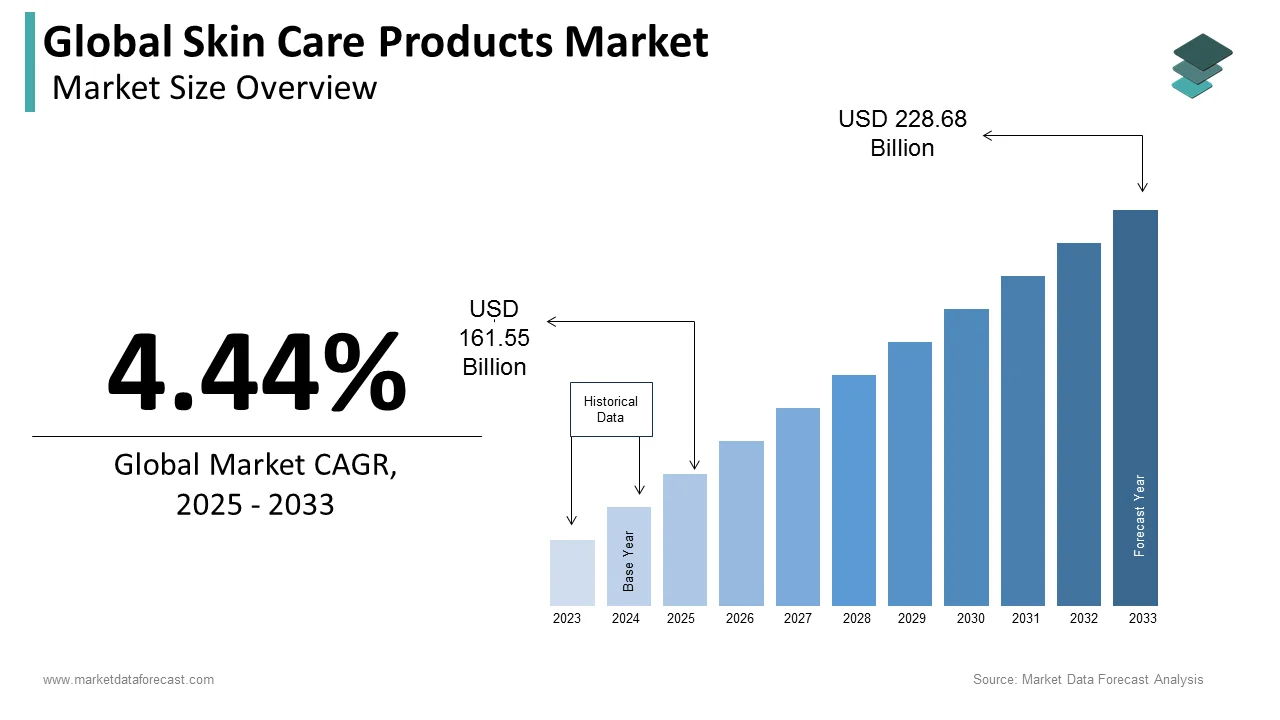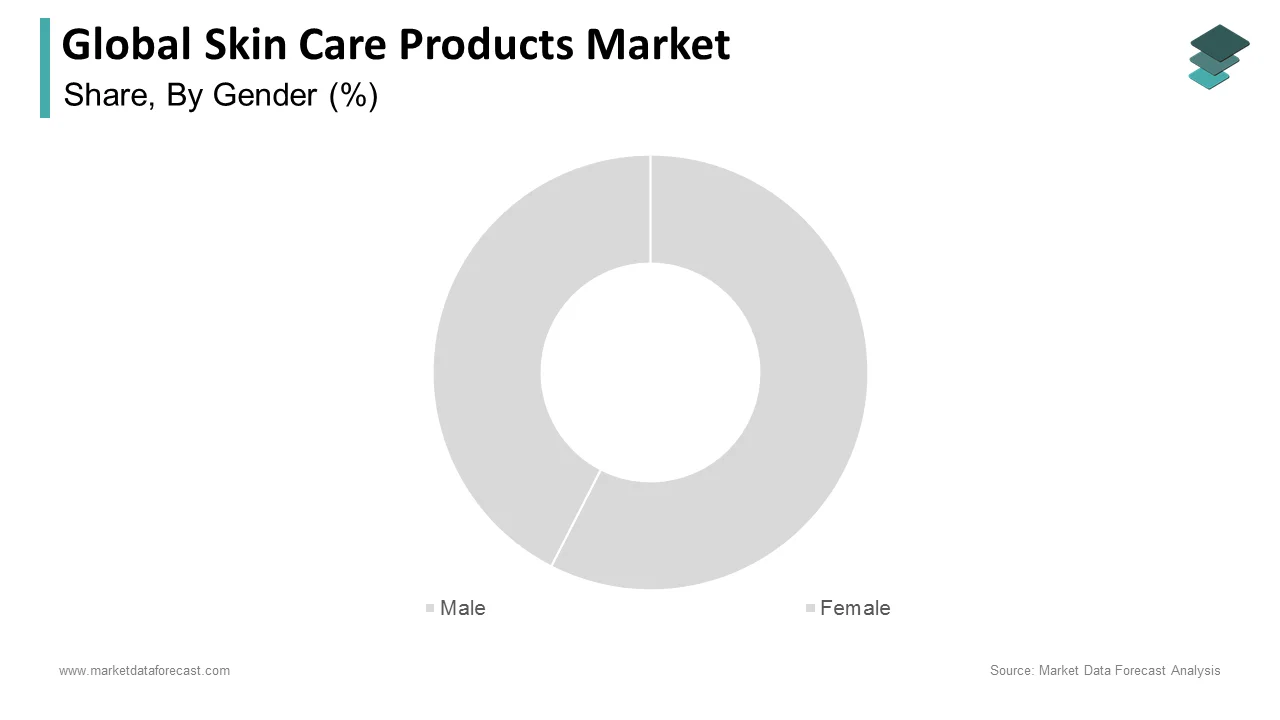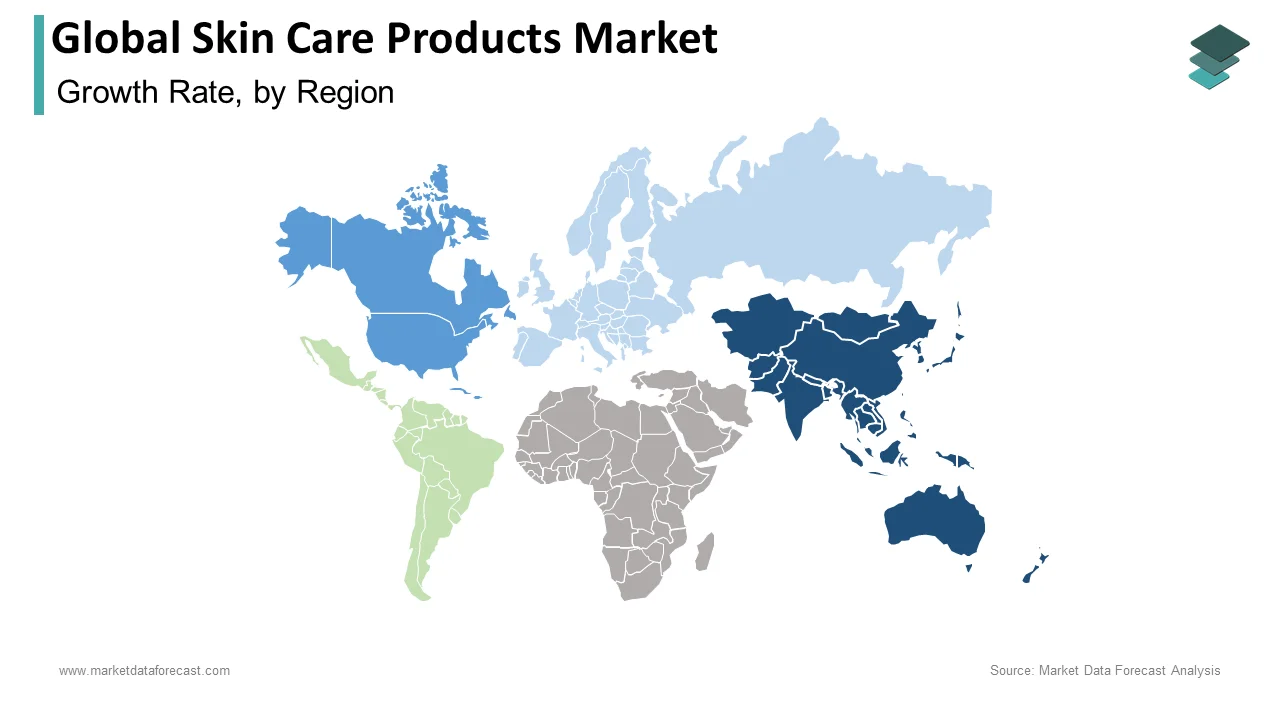Global Skin Care Products Market Size, Share, Trends & Growth Forecast Report By Product (Face Cream (Skin Brightening Cream, Anti-aging Cream, Sun Protection Cream), Body Lotion (Mass Market Body Care Lotion, Premium Body Care Lotion)) and Region (North America, Europe, Asia-Pacific, Latin America, Middle East and Africa), Industry Analysis From 2025 To 2033.
Global Skin Care Products Market Size
The global skin care products market was valued at USD 154.68 billion in 2024. The global market is projected to grow from USD 161.55 billion in 2025 to reach USD 228.68 billion by 2033, exhibiting a compound annual growth rate (CAGR) of 4.44% from 2025-2033.

Skincare products enhance the appearance of the skin and prevent various injuries. Skincare is a procedure to support skin integrity. These products will keep skin hydrated and allow the skin to be soft. The product is to be selected appropriately for the skin type as it may cause allergic reactions if it does not suit the skin's condition. Skincare products are also used in treatment procedures as medications for many skin diseases. Skincare products are in different forms, such as creams, gels, lotions, solutions, serums, and medicated facial pads. Poor-quality products can be ineffective and even dangerous, but good-quality products can help your skin look better now and in the future. Cosmetics, botulinum, exfoliation, fillers, laser resurfacing, microdermabrasion, peels, retinol therapy, and ultrasonic skin treatment are a few treatments used to improve appearances. Skincare products contain natural ingredients with high concentrations, which can help your skin fight wrinkles and loss of elasticity to prevent and heal skin Pigmentation and all different type of skin aging. All ages use skincare products, and both men and women use these.
MARKET DRIVERS
Growing usage and demand for customized skin products are significant factors driving the global skin care products market.
Customized products are used to address specific skin problems. These customized products give faster results when compared to general products, and a personalized approach to skincare will help you get the results you want.
The growing R&D efforts to develop more customer-friendly products are further accelerating the growth rate of the skin care products market.
As the demand for beauty products increases daily, scientists are looking for new and better alternatives to the traditional products currently available on the market. Researchers are trying harder to develop skin-friendly cosmetics for the skin. Scientists have designed products that are more effective in fighting the skin's aging fine lines due to scientific methodology carried out at the nanoscale, allowing tiny particles to penetrate deeply into the skin.
Anti-pollution skin care products provide a significant opportunity for the skin care products market.
Increasing air pollution in recent years resulted in increasing skin diseases. Therefore, anti-pollution skincare and cosmetic products are witnessing significant growth in the coming years and increasing awareness and concern regarding the adverse impact of various environmental pollutants on the skin.
Furthermore, increasing concern towards protecting skin from damage, rise in disposable income in urban areas, and shifting trends toward the modern techniques for treating skin diseases are further anticipated to promote the growth of the skincare products market. In addition, the growing prevalence of natural and organic products which have fewer or no side effects, increasing investments in research institutes to develop quality products, climatic changes, and a rise in the impact of the greenhouse are further predicted to fuel the growth rate of the skin care products market.
MARKET RESTRAINTS
Factors such as less awareness regarding product usage, lengthy approval process, and stringent FDA regulations are anticipated to hamper the growth rate of the skin care products market. In addition, the associated risk of diagnosing the deadliest diseases, such as cancer, by overusing cosmetic products is estimated to restrict the growth of the skincare products market.
REPORT COVERAGE
|
REPORT METRIC |
DETAILS |
|
Market Size Available |
2024 to 2033 |
|
Base Year |
2024 |
|
Forecast Period |
2025 to 2033 |
|
CAGR |
4.44% |
|
Segments Covered |
By Gender, Product, Distribution Channel, Ingredient, and Region. |
|
Various Analyses Covered |
Global, Regional, and country-level analysis; Segment-Level Analysis, DROC; PESTLE Analysis; Porter’s Five Forces Analysis, Competitive Landscape; Analyst Overview of Investment Opportunities |
|
Regions Covered |
North America, Europe, APAC, Latin America, Middle East & Africa |
|
Market Leaders Profiled |
Avon Products, Inc., Shiseido Company, Ltd., L'Oréal S.A., Unilever, Beiersdorf AG, Johnson and Johnson, Revlon, Inc., The Estée Lauder Companies, Inc., Procter & Gamble Company, and Colgate-Palmolive Company, and Others. |
SEGMENTAL ANALYSIS
By Gender Insights

The female segment accounted for the largest share of the skin care products market worldwide in 2024. 82% of the females are using these skin care products. Most of the women said that they use skin care products to take care of themselves and others said that skin care use prevents signs of aging.
By Product Insights
The face creams & moisturizers segment led the skin care products market globally in 2024. Dermatologists recommend people moisturize their face after washing because the moisturizer traps that water in the skin. In addition, moisturizing helps soothe eczema, psoriasis, or rosacea symptoms, which drives the market forward.
By Distribution Channel Insights
Based on the distribution channel, the supermarkets & hypermarkets segment had a significant market share in 2024. In supermarkets, we can get any skincare product easily. In addition, supermarkets offer products at relatively low prices by using their buying power to buy goods from manufacturers at lower prices than smaller stores. Another developing trend is partnerships between supermarkets and fast-delivery services.
By Ingredient Insights
Based on the ingredient, the natural segment accounted for the leading share of the skin care products market in 2024. 74% of females are more likely to use skin care products with natural and organic ingredients. This choice is also more vital among women with higher monthly family incomes, and plants contain naturally occurring minerals, vitamins, proteins, carbohydrates, good fatty acids, and free fatty acids. In addition, the vital antioxidants in a good skincare routine support the skin's renewal.
REGIONAL ANALYSIS

Asia Pacific dominated the market for skin care products worldwide in 2024. The growing availability of different skincare products drives the market forward in this region. China's skincare sector has been growing rapidly with the economy's growth. China is the second-largest market in the world for skincare products. By 2050, the size of the skincare market is anticipated to exceed 60 billion dollars, according to Trend. Therefore, the Chinese market has a good opportunity for skincare brands looking to expand their activities overseas.
The North American region is anticipated to account for a substantial global market share during the forecast period. According to the American Academy of Dermatology, approximately 40 to 50 million Americans suffer acne each year. According to the NPD Group’s 2020 Women’s Facial Skincare Consumer Report, more women in the U.S. are using facial skincare products compared to one year ago. In the United States, facial cleansers and acne treatments are the two skincare products used by many people. Canada has the highest market share due to increasing awareness of skin care products and best-formalized creams. In addition, Canadian beauty brands are leading the way in using plant-based solutions to your skincare problems. Regular use of these products will leave your skin feeling beautiful and radiant.
Europe has had moderate growth during the pandemic. Stringent European Cosmetics Regulations govern all cosmetic products and their ingredients to ensure their safety for use. The Regulation establishes the types of colors, UV filters, and preservatives that may be used in cosmetics, as well as which substances may only be used in specific amounts or at all.
KEY MARKET PARTICIPANTS
Avon Products, Inc., Shiseido Company, Ltd., L'Oréal S.A., Unilever, Beiersdorf AG, Johnson and Johnson, Revlon, Inc., The Estée Lauder Companies, Inc., Procter & Gamble Company, and Colgate-Palmolive Company are some of the noteworthy companies in the global skin care products market profiled in this report.
RECENT HAPPENINGS IN THIS MARKET
- The prestige brand SHISEIDO launched ULTIMUNE Power Infusing Concentrate III, on July 1, 2021, with a new enhanced formula and packaging; the serum is a renewal of the iconic serum ULTIMUNE Power Infusing Concentrate N.
- In 2019, NX In South Korea, Nivea launched Beiersdorf's first accelerator program for international beauty brands.
MARKET SEGMENTATION
This research report on the global skin care products market has been segmented and sub-segmented based on the type, end-user, and region.
By Gender
- Male
- Female
By Product
- Face Creams & Moisturizers
- Cleansers & Face Wash
- Sunscreen
- Body Creams & Moisturizers
- Shaving Lotions & Creams
By Distribution Channel
- Supermarkets & Hypermarkets
- Convenience Stores
- Pharmacy & drugstore
- Online
By Ingredient
- Chemical
- Natural
By Region
- North America
- Europe
- Asia Pacific
- Latin America
- Middle East and Africa
Frequently Asked Questions
What was the size of the skin care products market worldwide in 2024?
The global skin care products market size was valued at USD 154.68 billion in 2024.
Which region is growing the fastest in the global skin care products market?
Geographically, the APAC region is anticipated to be the fastest-growing regional market in the global market.
What is the value of the North American skin care products market by 2033?
The North American skin care products market is anticipated to grow by USD 228.68 billion by 2033.
Which are the major players operating in the skin care products market?
Companies playing a key role in the global skin care products market are Avon Products, Inc., Shiseido Company, Ltd., L'Oréal S.A., Unilever, Beiersdorf AG, Johnson and Johnson, Revlon, Inc., The Estée Lauder Companies, Inc., Procter & Gamble Company, and Colgate-Palmolive Company.
Related Reports
Access the study in MULTIPLE FORMATS
Purchase options starting from $ 2500
Didn’t find what you’re looking for?
TALK TO OUR ANALYST TEAM
Need something within your budget?
NO WORRIES! WE GOT YOU COVERED!
Call us on: +1 888 702 9696 (U.S Toll Free)
Write to us: [email protected]
